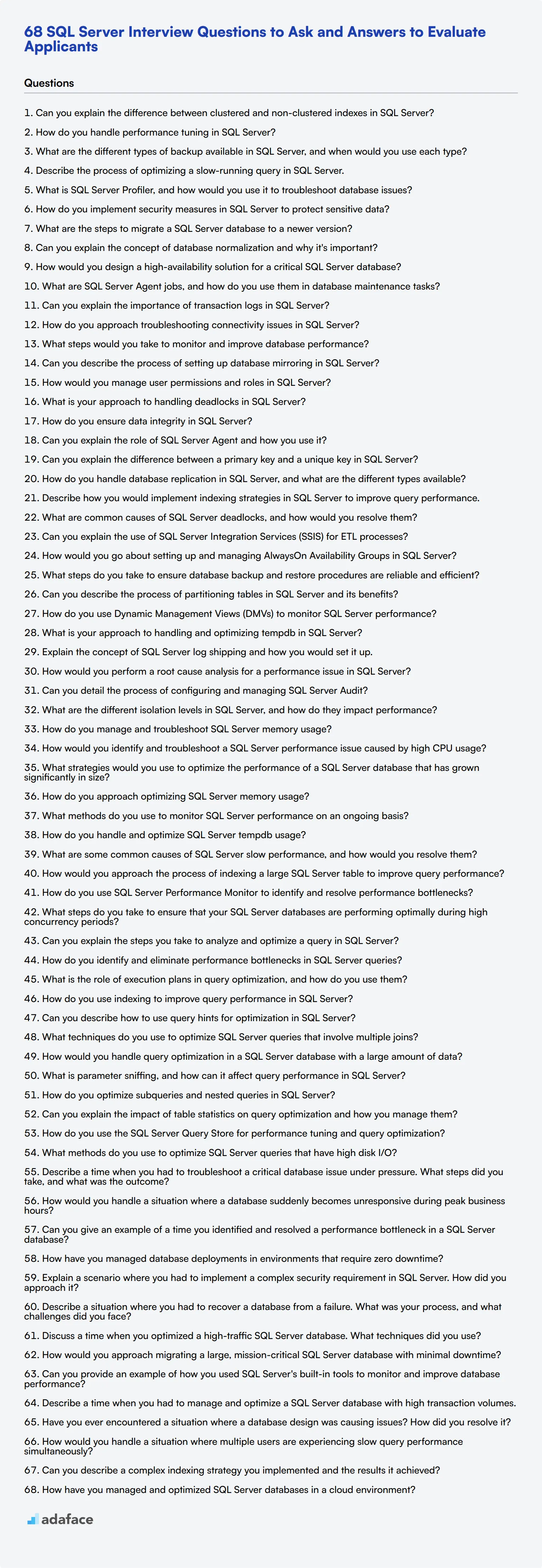Hiring the right SQL Server professionals is crucial for maintaining robust database systems and ensuring smooth business operations. Asking targeted interview questions helps recruiters and hiring managers assess candidates' technical skills and problem-solving abilities effectively.
This blog post provides a comprehensive list of SQL Server interview questions, categorized by experience level and specific areas of expertise. From basic concepts for junior administrators to advanced performance tuning queries for seasoned professionals, we cover a wide range of topics to help you evaluate candidates thoroughly.
By using these questions, you can identify top talent and make informed hiring decisions. Consider combining these interview questions with a pre-employment SQL Server assessment to get a complete picture of candidates' abilities.
Table of contents
10 common SQL Server interview questions to ask your applicants
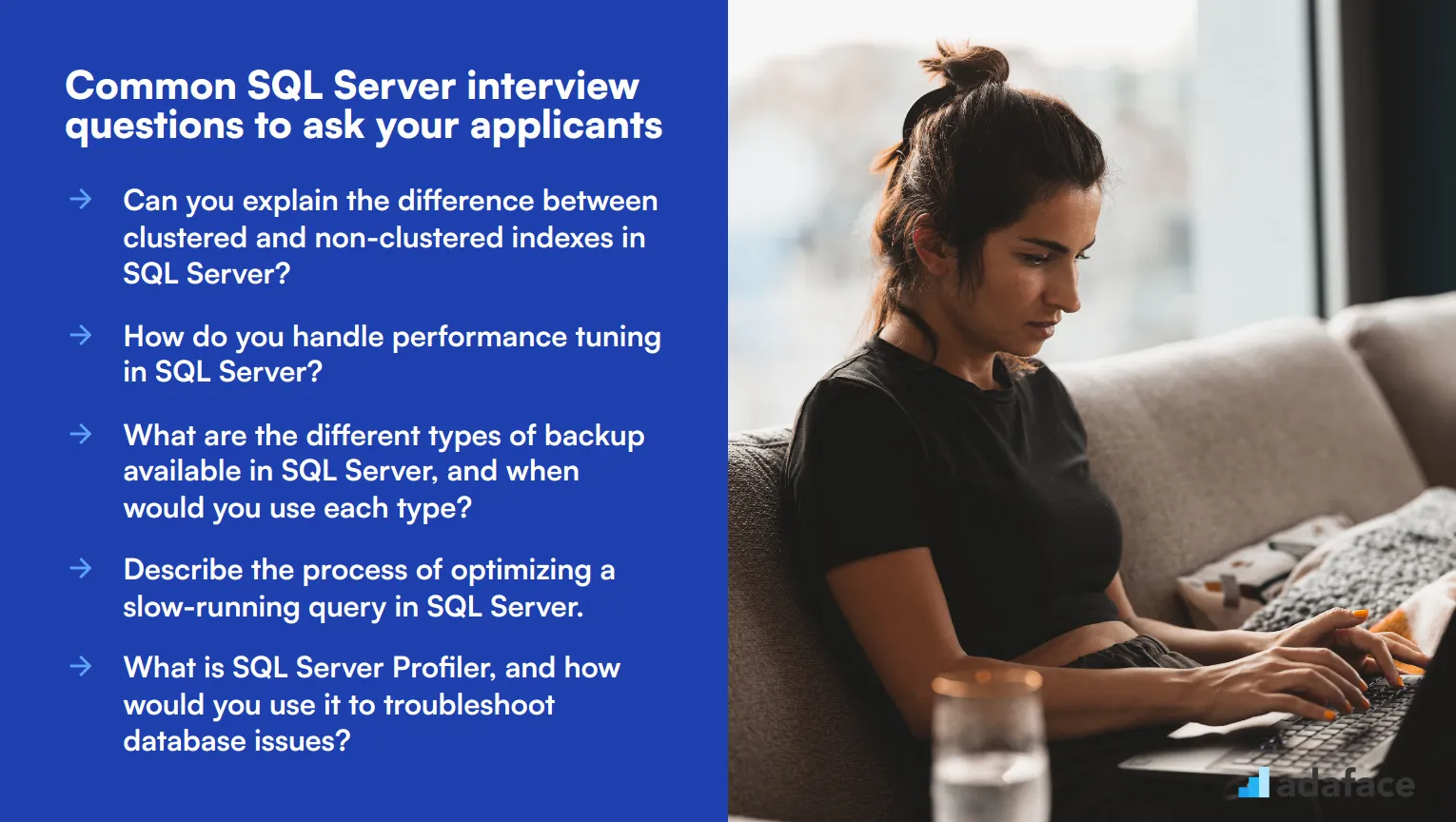
To determine whether your applicants have the right skills to manage and optimize SQL Server databases, ask them some of these 10 common SQL Server interview questions. These questions can help you gauge their technical knowledge, problem-solving abilities, and hands-on experience. For a more detailed guide on the role, you can refer to our comprehensive SQL Server DBA job description.
- Can you explain the difference between clustered and non-clustered indexes in SQL Server?
- How do you handle performance tuning in SQL Server?
- What are the different types of backup available in SQL Server, and when would you use each type?
- Describe the process of optimizing a slow-running query in SQL Server.
- What is SQL Server Profiler, and how would you use it to troubleshoot database issues?
- How do you implement security measures in SQL Server to protect sensitive data?
- What are the steps to migrate a SQL Server database to a newer version?
- Can you explain the concept of database normalization and why it's important?
- How would you design a high-availability solution for a critical SQL Server database?
- What are SQL Server Agent jobs, and how do you use them in database maintenance tasks?
8 SQL Server interview questions and answers to evaluate junior database administrators
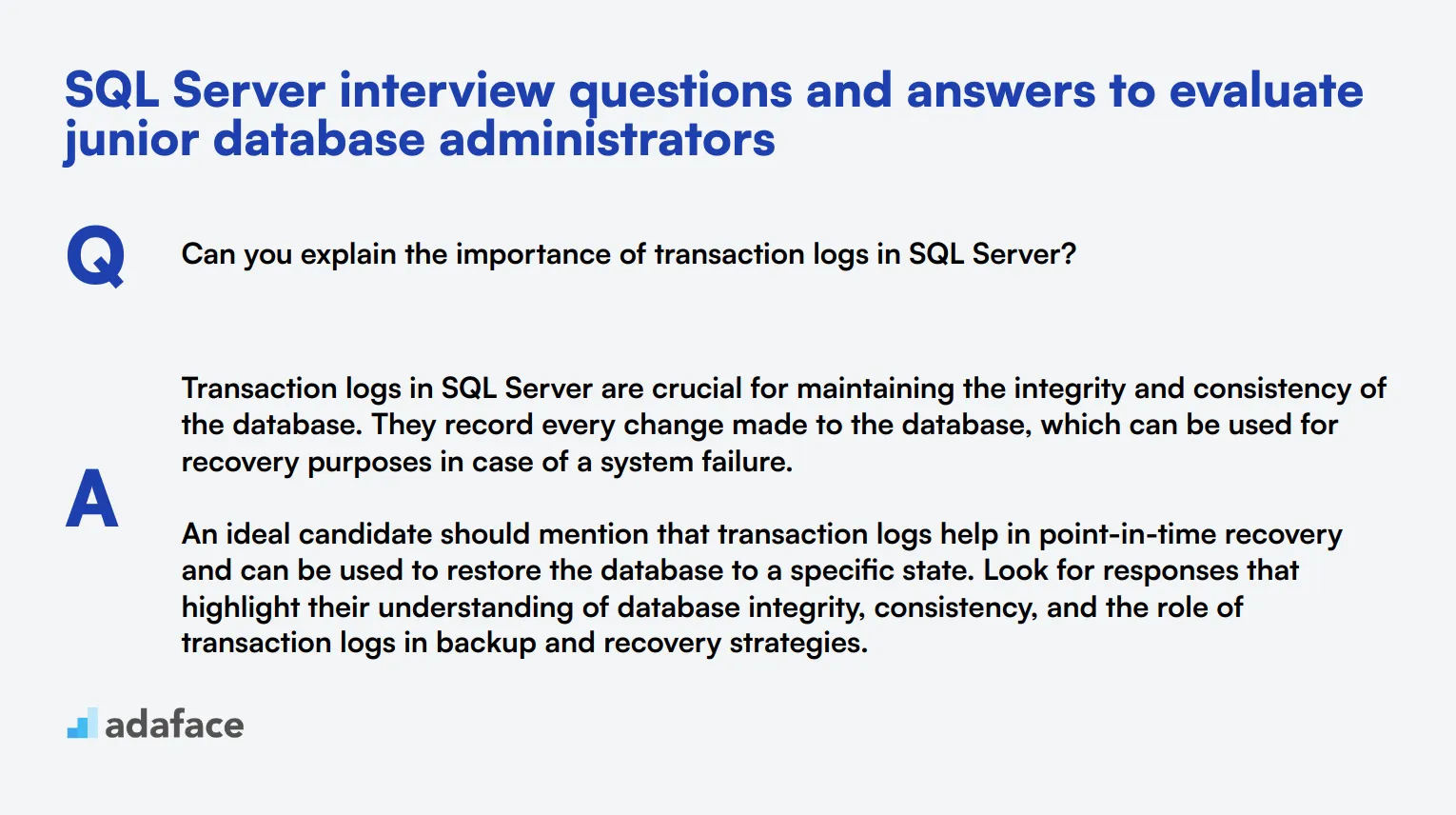
To assess whether applicants have the essential skills for junior database administrator roles, consider using these interview questions. They are designed to evaluate the candidate's understanding of core SQL Server concepts and practical problem-solving abilities.
1. Can you explain the importance of transaction logs in SQL Server?
Transaction logs in SQL Server are crucial for maintaining the integrity and consistency of the database. They record every change made to the database, which can be used for recovery purposes in case of a system failure.
An ideal candidate should mention that transaction logs help in point-in-time recovery and can be used to restore the database to a specific state. Look for responses that highlight their understanding of database integrity, consistency, and the role of transaction logs in backup and recovery strategies.
2. How do you approach troubleshooting connectivity issues in SQL Server?
When troubleshooting connectivity issues in SQL Server, the first step is to check the network settings and ensure that the server is reachable. Next, verify the SQL Server configuration, including the SQL Server and SQL Browser services, and ensure they are running.
Candidates should also mention checking firewall settings and SQL Server instance configurations. An ideal answer should demonstrate a systematic approach to identifying and resolving connectivity issues, including checking error logs and using diagnostic tools.
3. What steps would you take to monitor and improve database performance?
To monitor and improve database performance, start by identifying bottlenecks using tools like SQL Server Profiler and Performance Monitor. Regularly review query execution plans and index usage statistics.
Candidates should also discuss the importance of regularly updating statistics, optimizing queries, and possibly implementing indexing strategies. Look for answers that show a proactive approach to performance monitoring and a good understanding of SQL Server's built-in tools.
4. Can you describe the process of setting up database mirroring in SQL Server?
Setting up database mirroring in SQL Server involves preparing the principal and mirror servers by ensuring that both are running the same version of SQL Server. Next, take a full backup of the principal database and restore it on the mirror server with the NORECOVERY option.
Candidates should also mention configuring the endpoints, starting the mirroring session, and monitoring the mirroring status. An ideal response should demonstrate their understanding of high-availability solutions and the steps involved in setting up database mirroring.
5. How would you manage user permissions and roles in SQL Server?
Managing user permissions and roles in SQL Server involves creating logins and users, assigning them to database roles, and granting or revoking specific permissions. It's essential to follow the principle of least privilege, giving users only the permissions they need to perform their tasks.
Candidates should also discuss using fixed database roles and creating custom roles for more granular control. Look for responses that show a good understanding of security practices and the ability to manage permissions effectively.
6. What is your approach to handling deadlocks in SQL Server?
Deadlocks occur when two or more sessions block each other indefinitely. To handle deadlocks, first identify and analyze the deadlock using tools like SQL Server Profiler or Extended Events. Then, optimize the queries involved to minimize the chance of deadlocks, such as by ensuring they access resources in the same order.
Candidates should also mention implementing retry logic in applications to handle deadlock errors gracefully. An ideal answer should demonstrate their ability to identify, analyze, and mitigate deadlocks effectively.
7. How do you ensure data integrity in SQL Server?
Ensuring data integrity in SQL Server involves implementing constraints such as primary keys, foreign keys, unique constraints, and check constraints. These constraints enforce rules at the database level to maintain consistent and accurate data.
Candidates should also discuss using triggers and stored procedures to enforce business rules and data validation. Look for responses that show a comprehensive understanding of data integrity mechanisms and their practical application in SQL Server.
8. Can you explain the role of SQL Server Agent and how you use it?
SQL Server Agent is a component of SQL Server that allows you to automate administrative tasks through scheduled jobs, alerts, and operators. It is commonly used for tasks such as database backups, index maintenance, and running custom scripts.
Candidates should describe their experience with creating and managing SQL Server Agent jobs, setting up alerts for monitoring, and using operators to notify administrators of issues. Look for answers that demonstrate a practical understanding of how to use SQL Server Agent to automate and streamline administrative tasks.
15 intermediate SQL Server interview questions and answers to ask mid-tier database administrators
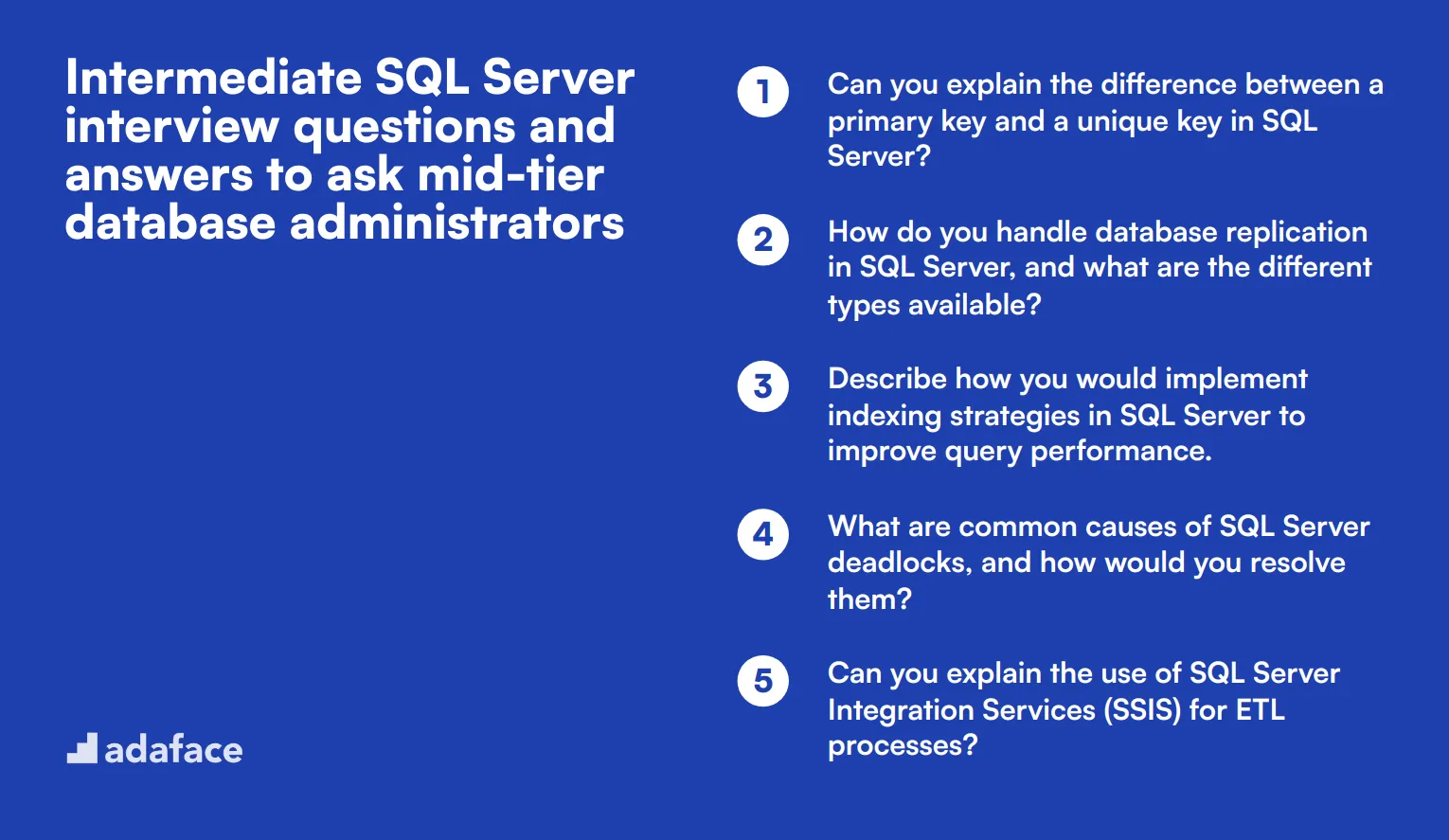
To determine whether your applicants have the right skills to manage and optimize SQL Server databases, ask them some of these intermediate SQL Server interview questions. This list will help you assess their technical proficiency and problem-solving abilities, ensuring they are well-prepared for mid-tier database administration roles. For more detailed role descriptions, check out this SQL Server DBA job description.
- Can you explain the difference between a primary key and a unique key in SQL Server?
- How do you handle database replication in SQL Server, and what are the different types available?
- Describe how you would implement indexing strategies in SQL Server to improve query performance.
- What are common causes of SQL Server deadlocks, and how would you resolve them?
- Can you explain the use of SQL Server Integration Services (SSIS) for ETL processes?
- How would you go about setting up and managing AlwaysOn Availability Groups in SQL Server?
- What steps do you take to ensure database backup and restore procedures are reliable and efficient?
- Can you describe the process of partitioning tables in SQL Server and its benefits?
- How do you use Dynamic Management Views (DMVs) to monitor SQL Server performance?
- What is your approach to handling and optimizing tempdb in SQL Server?
- Explain the concept of SQL Server log shipping and how you would set it up.
- How would you perform a root cause analysis for a performance issue in SQL Server?
- Can you detail the process of configuring and managing SQL Server Audit?
- What are the different isolation levels in SQL Server, and how do they impact performance?
- How do you manage and troubleshoot SQL Server memory usage?
9 SQL Server interview questions and answers related to performance tuning
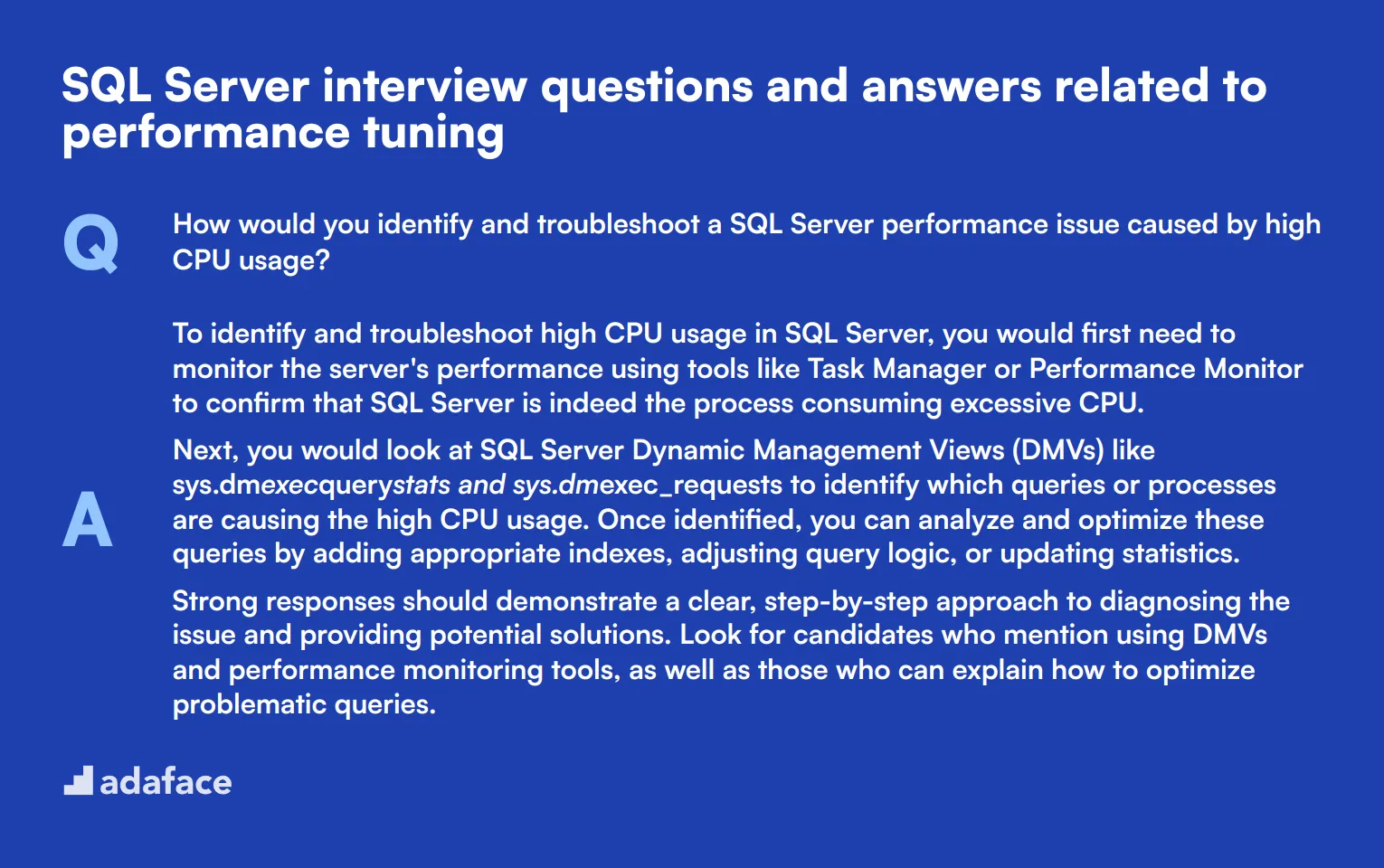
To ensure your candidates have the necessary skills to optimize and maintain SQL Server performance, here are some essential SQL Server interview questions and answers related to performance tuning. Use these to gauge your applicants' problem-solving abilities and deep understanding of SQL Server's inner workings.
1. How would you identify and troubleshoot a SQL Server performance issue caused by high CPU usage?
To identify and troubleshoot high CPU usage in SQL Server, you would first need to monitor the server's performance using tools like Task Manager or Performance Monitor to confirm that SQL Server is indeed the process consuming excessive CPU.
Next, you would look at SQL Server Dynamic Management Views (DMVs) like sys.dm_exec_query_stats and sys.dm_exec_requests to identify which queries or processes are causing the high CPU usage. Once identified, you can analyze and optimize these queries by adding appropriate indexes, adjusting query logic, or updating statistics.
Strong responses should demonstrate a clear, step-by-step approach to diagnosing the issue and providing potential solutions. Look for candidates who mention using DMVs and performance monitoring tools, as well as those who can explain how to optimize problematic queries.
2. What strategies would you use to optimize the performance of a SQL Server database that has grown significantly in size?
To optimize a SQL Server database that has grown significantly, you could start by evaluating and cleaning up unused or redundant data. This includes archiving old data to a different database or deleting it if it's no longer needed.
Another strategy is to implement indexing strategies, such as adding or updating indexes on frequently queried columns. Additionally, consider partitioning large tables to improve query performance and manageability.
Candidates should mention these strategies and explain how they can directly impact database performance. Ideal responses will include a mix of data management and indexing techniques, as well as an understanding of how to implement them effectively.
3. How do you approach optimizing SQL Server memory usage?
Optimizing SQL Server memory usage involves configuring the server's memory settings according to the available resources and workload requirements. This includes setting appropriate values for minimum and maximum server memory to ensure SQL Server does not consume all available system memory.
Additionally, monitoring memory usage through DMVs such as sys.dm_os_memory_clerks and sys.dm_exec_query_memory_grants can help identify and address any specific queries or processes that are consuming excessive memory. Adjusting these queries or processes can help improve overall memory usage.
Look for candidates who emphasize the importance of configuring memory settings and monitoring memory usage. Strong answers should include specific DMVs and demonstrate an understanding of how to balance memory allocation for optimal performance.
4. What methods do you use to monitor SQL Server performance on an ongoing basis?
To monitor SQL Server performance on an ongoing basis, you can use built-in tools such as SQL Server Profiler, Performance Monitor, and Extended Events. These tools help track various performance metrics, including query execution times, wait statistics, and resource usage.
Additionally, setting up performance alerts in SQL Server Agent and using Dynamic Management Views (DMVs) like sys.dm_os_wait_stats and sys.dm_exec_query_stats can provide real-time insights into server performance and help identify potential issues before they impact users.
Ideal candidate responses should mention specific tools and techniques they use to monitor performance continuously. Look for candidates who demonstrate a proactive approach to performance monitoring and the ability to interpret and act on the collected data.
5. How do you handle and optimize SQL Server tempdb usage?
To handle and optimize tempdb usage in SQL Server, you should first ensure that tempdb is configured correctly. This includes setting the appropriate number of data files (typically one per CPU core) and distributing them across separate storage devices to balance I/O load.
Monitoring tempdb usage through DMVs like sys.dm_db_file_space_usage can help identify and resolve issues related to excessive tempdb usage by particular queries or processes. Implementing best practices such as avoiding large temp tables and minimizing tempdb contention can also improve performance.
Candidates should demonstrate an understanding of tempdb configuration and optimization techniques. Look for responses that include specific steps and tools for monitoring tempdb usage and addressing common issues.
6. What are some common causes of SQL Server slow performance, and how would you resolve them?
Common causes of SQL Server slow performance include poorly optimized queries, lack of proper indexing, high CPU or memory usage, and I/O bottlenecks. To resolve these issues, you can start by analyzing and optimizing slow-running queries using tools like SQL Server Profiler and Execution Plans.
Next, ensure that indexes are appropriately created and maintained, and consider adding new indexes to improve query performance. Regularly monitoring server resource usage can help identify and address CPU, memory, and I/O issues.
Strong candidates should identify these common causes and provide clear steps for resolving them. Look for responses that mention specific tools and techniques for query optimization, indexing, and resource monitoring.
7. How would you approach the process of indexing a large SQL Server table to improve query performance?
To index a large SQL Server table, you would start by analyzing the queries that frequently access this table to determine which columns are most often used in WHERE clauses, JOIN conditions, and ORDER BY clauses. These columns are good candidates for indexing.
Next, you would create appropriate indexes, such as clustered or non-clustered indexes, based on the query patterns. It's also essential to regularly update statistics to ensure the SQL Server query optimizer has the most accurate information.
Candidates should demonstrate a methodical approach to indexing, focusing on analyzing query patterns and understanding different types of indexes. Look for responses that show an understanding of the importance of updating statistics and how indexing improves query performance.
8. How do you use SQL Server Performance Monitor to identify and resolve performance bottlenecks?
SQL Server Performance Monitor is a tool that allows you to track various performance metrics, such as CPU usage, memory usage, disk I/O, and network activity. To identify performance bottlenecks, you can create performance counters for these metrics and monitor their values over time.
By analyzing the collected data, you can pinpoint specific areas where performance issues occur. For example, high disk I/O might indicate a need for better indexing or hardware upgrades, while high CPU usage could be due to inefficient queries.
Look for candidates who can explain how to set up and interpret performance counters in SQL Server Performance Monitor. Ideal answers should include examples of how they have used this tool to resolve specific performance issues.
9. What steps do you take to ensure that your SQL Server databases are performing optimally during high concurrency periods?
To ensure optimal performance during high concurrency periods, you should focus on minimizing contention and resource bottlenecks. This includes optimizing queries and indexing strategies to reduce locking and blocking.
Additionally, consider implementing techniques like query parallelism and partitioning to distribute the workload more evenly. Monitoring and adjusting resource allocation, such as CPU and memory, can also help manage high concurrency effectively.
Candidates should demonstrate an understanding of how to manage and optimize SQL Server performance during high concurrency. Look for responses that include specific techniques and strategies for reducing contention and distributing workload.
12 SQL Server interview questions about query optimization
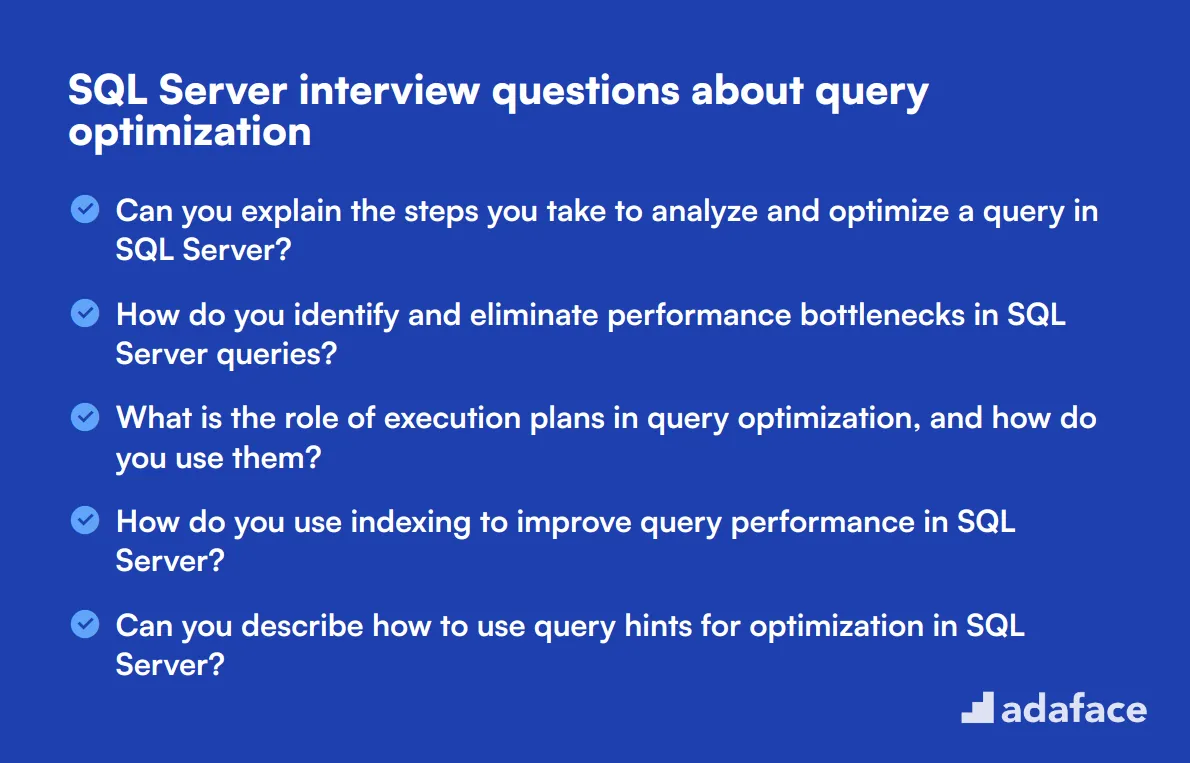
To determine if your candidates possess the necessary skills to optimize SQL Server queries efficiently, consider asking some of these query optimization interview questions. These questions will help you gauge their technical expertise and problem-solving abilities, ensuring they can handle real-world database challenges effectively. For more insights on crafting job descriptions for database roles, check out this SQL Server DBA job description.
- Can you explain the steps you take to analyze and optimize a query in SQL Server?
- How do you identify and eliminate performance bottlenecks in SQL Server queries?
- What is the role of execution plans in query optimization, and how do you use them?
- How do you use indexing to improve query performance in SQL Server?
- Can you describe how to use query hints for optimization in SQL Server?
- What techniques do you use to optimize SQL Server queries that involve multiple joins?
- How would you handle query optimization in a SQL Server database with a large amount of data?
- What is parameter sniffing, and how can it affect query performance in SQL Server?
- How do you optimize subqueries and nested queries in SQL Server?
- Can you explain the impact of table statistics on query optimization and how you manage them?
- How do you use the SQL Server Query Store for performance tuning and query optimization?
- What methods do you use to optimize SQL Server queries that have high disk I/O?
14 situational SQL Server interview questions for hiring top database administrators
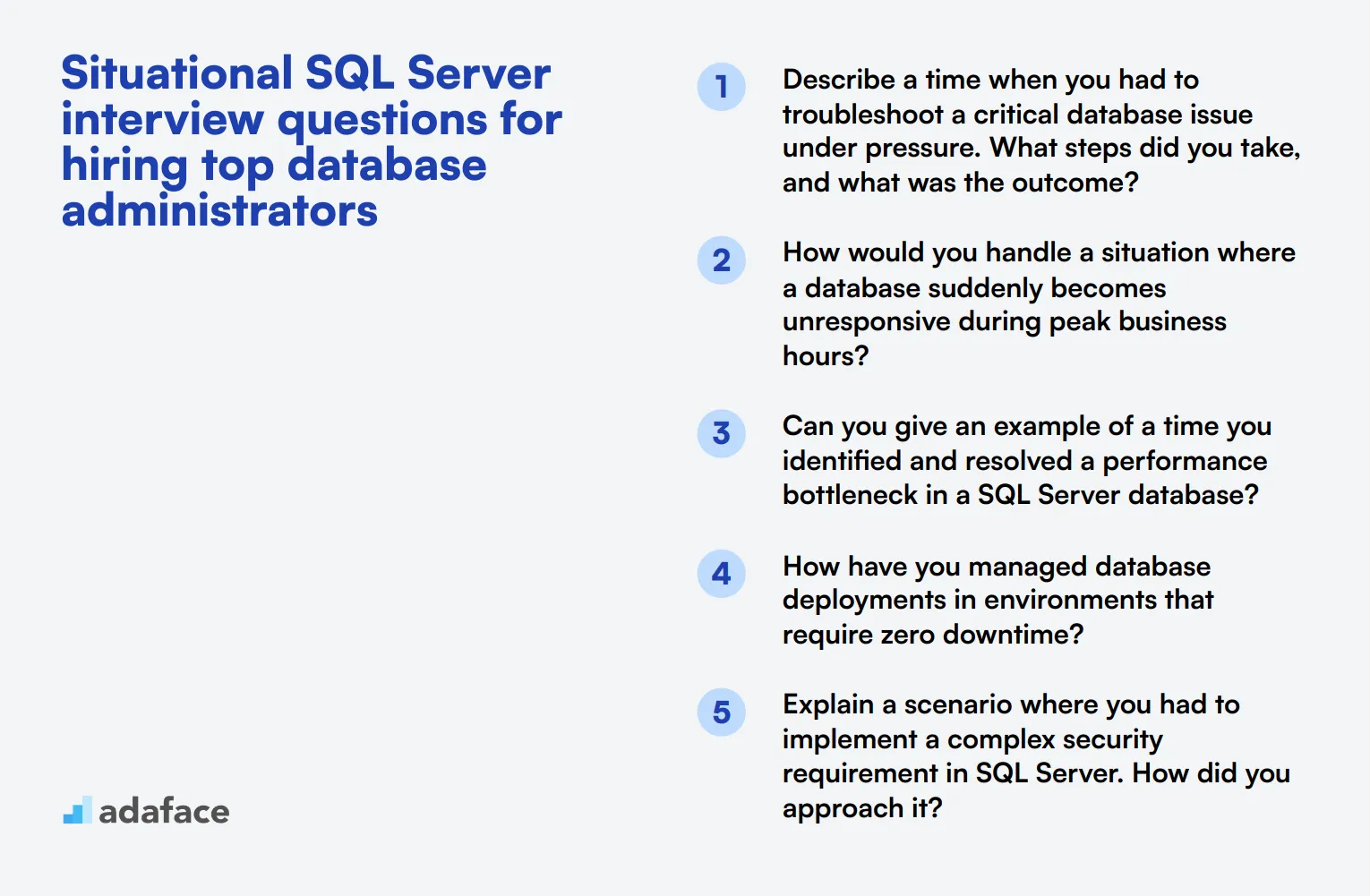
To identify top-tier database administrators for your team, consider using this list of situational SQL Server interview questions. These questions will help you evaluate a candidate's problem-solving abilities and practical skills in real-world scenarios. For more on what to look for in a SQL Server DBA, check out this SQL Server DBA job description.
- Describe a time when you had to troubleshoot a critical database issue under pressure. What steps did you take, and what was the outcome?
- How would you handle a situation where a database suddenly becomes unresponsive during peak business hours?
- Can you give an example of a time you identified and resolved a performance bottleneck in a SQL Server database?
- How have you managed database deployments in environments that require zero downtime?
- Explain a scenario where you had to implement a complex security requirement in SQL Server. How did you approach it?
- Describe a situation where you had to recover a database from a failure. What was your process, and what challenges did you face?
- Discuss a time when you optimized a high-traffic SQL Server database. What techniques did you use?
- How would you approach migrating a large, mission-critical SQL Server database with minimal downtime?
- Can you provide an example of how you used SQL Server's built-in tools to monitor and improve database performance?
- Describe a time when you had to manage and optimize a SQL Server database with high transaction volumes.
- Have you ever encountered a situation where a database design was causing issues? How did you resolve it?
- How would you handle a situation where multiple users are experiencing slow query performance simultaneously?
- Can you describe a complex indexing strategy you implemented and the results it achieved?
- How have you managed and optimized SQL Server databases in a cloud environment?
Which SQL Server skills should you evaluate during the interview phase?
While it's impossible to assess every aspect of a candidate's SQL Server expertise in a single interview, focusing on core skills is essential. The following key areas provide a solid foundation for evaluating SQL Server proficiency during the interview process.
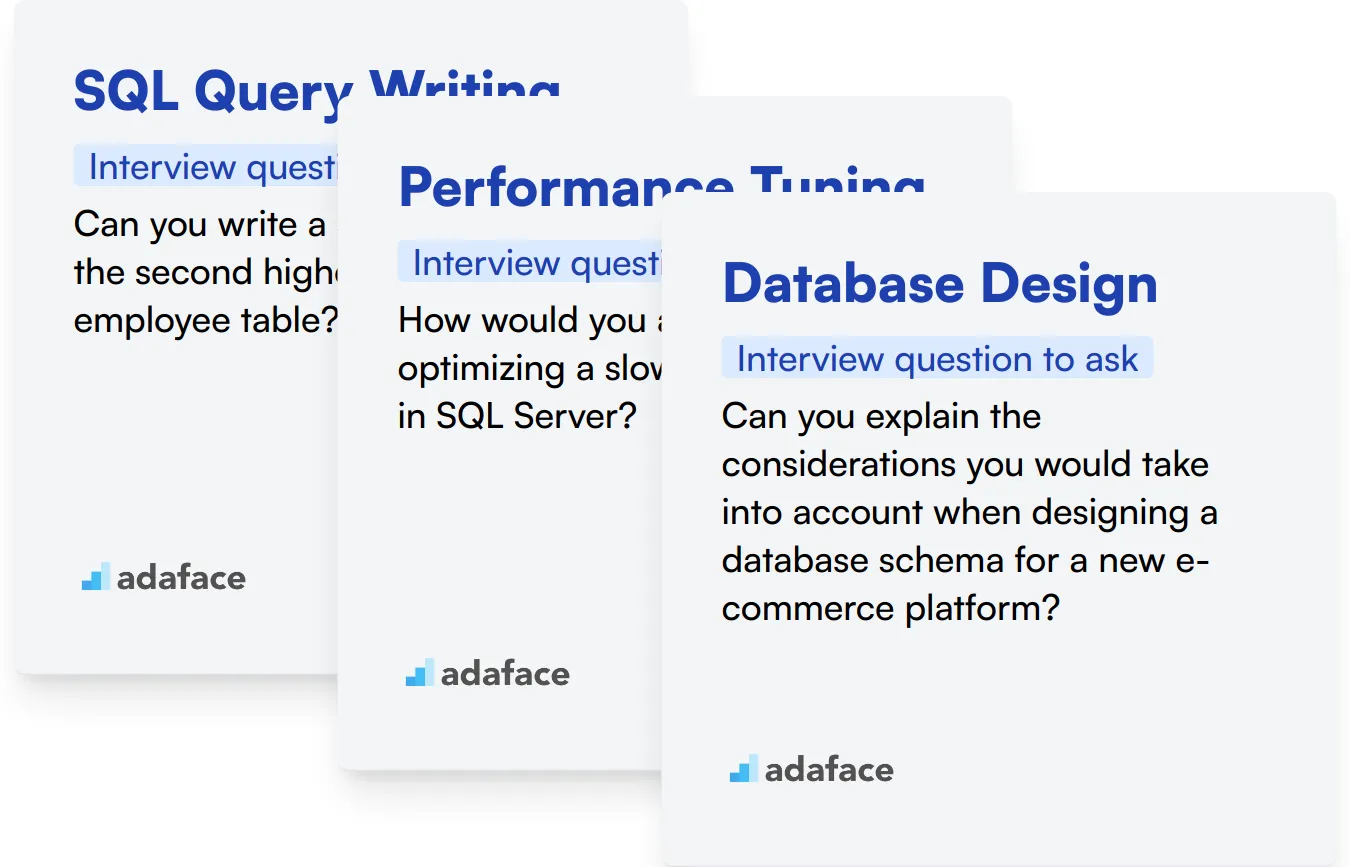
SQL Query Writing
Proficiency in SQL query writing is fundamental for any SQL Server role. It forms the basis for data retrieval, manipulation, and analysis tasks that are central to database management.
Consider using an SQL coding test with relevant multiple-choice questions to evaluate candidates' query writing skills. This can help filter out candidates with strong foundational knowledge.
To assess SQL query writing skills in the interview, you can ask targeted questions. Here's an example:
Can you write a SQL query to find the second highest salary from an employee table?
Look for candidates who can write an efficient query, possibly using subqueries or window functions. Pay attention to their thought process and how they handle edge cases like ties or null values.
Performance Tuning
Performance tuning is critical for maintaining efficient database operations. It involves optimizing queries, indexing strategies, and understanding execution plans to enhance overall system performance.
An SQL Server online test can include questions on query optimization and index usage to gauge a candidate's understanding of performance tuning concepts.
To evaluate performance tuning skills during the interview, consider asking:
How would you approach optimizing a slow-running query in SQL Server?
Listen for mentions of analyzing execution plans, reviewing indexing strategies, and considering query structure. A strong candidate will discuss systematic approaches to identifying and resolving performance bottlenecks.
Database Design
Effective database design is crucial for data integrity, scalability, and performance. It encompasses understanding normalization, relationships, and choosing appropriate data types.
To assess database design skills, you might ask:
Can you explain the considerations you would take into account when designing a database schema for a new e-commerce platform?
Look for answers that demonstrate understanding of normalization principles, entity relationships, and scalability considerations. A strong candidate will also mention aspects like indexing strategy and data type selection.
Tips for Effective SQL Server Interviews
Before putting your new knowledge into action, here are some tips to make your SQL Server interviews more effective and insightful.
1. Start with a SQL skills assessment
Begin your hiring process with a SQL skills assessment to filter candidates efficiently. This approach saves time and ensures you're interviewing candidates with the right technical skills.
For SQL Server positions, consider using a MS SQL Server online test or a T-SQL test. These assessments evaluate candidates' practical skills in database management and query writing.
Skill assessments provide objective data on candidates' abilities, helping you make informed decisions. They also allow you to focus your interviews on more specific areas, making the process more productive for both you and the candidate.
2. Prepare a balanced set of interview questions
Compile a mix of technical and situational questions to assess both knowledge and problem-solving skills. This balanced approach helps you evaluate candidates more comprehensively in the limited time you have.
Include questions about database design, query optimization, and performance tuning. Also, consider adding questions about related technologies like Azure or data modeling to gauge their broader understanding.
Don't forget to assess soft skills like communication and teamwork. These are key for database administrators who often work closely with other teams.
3. Ask probing follow-up questions
Prepare to ask follow-up questions to dig deeper into candidates' responses. This technique helps you distinguish between surface-level knowledge and true expertise.
For example, if a candidate mentions using indexes for query optimization, follow up by asking about specific types of indexes and their use cases. This approach reveals the depth of their understanding and practical experience with SQL Server.
Use SQL Server interview questions and skills tests to hire talented database administrators
If you are looking to hire someone with SQL Server skills, it's important to ensure they possess the capabilities you need. An accurate way to do this is by using skill tests like the SQL Server Online Test or the MS SQL Server Online Test.
Once you use these tests, you can shortlist the best applicants and invite them for interviews. For setting up these tests, you can sign up or visit our test library to find the right assessment for your needs.
SQL Online Test
Download SQL Server interview questions template in multiple formats
SQL Server Interview Questions FAQs
Common questions can include topics like database design, query optimization, and performance tuning.
Ask questions focused on SQL basics, data manipulation, and basic administrative tasks to gauge their foundational knowledge.
Include intermediate-level questions that cover performance tuning, complex queries, and specific SQL Server features.
They help assess how candidates approach real-world problems and make decisions under pressure.
Focus on database design, querying, performance tuning, and situational problem-solving.
Ask about their experience with indexing, query optimization, and troubleshooting performance issues.

40 min skill tests.
No trick questions.
Accurate shortlisting.
We make it easy for you to find the best candidates in your pipeline with a 40 min skills test.
Try for freeRelated posts
Free resources




